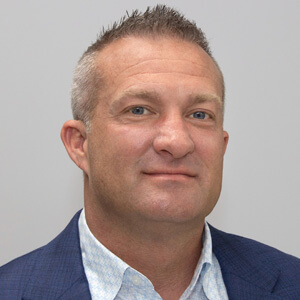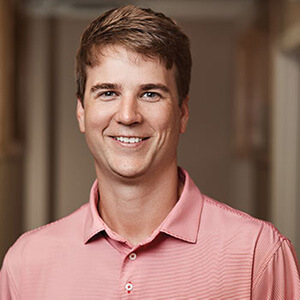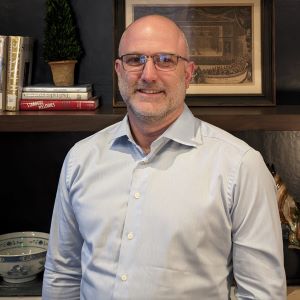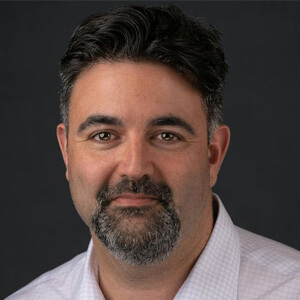
Listen Transcript Share this on:

Dustin Dobbs is the President of Dobbs Tire & Auto Centers, a family-owned business headquartered in St. Louis. Under his leadership, Dobbs Tire & Auto Centers has expanded to over 50 locations across Missouri, Illinois, and Texas. Dustin was immersed in the family business from a young age, instilling in him a strong work ethic and commitment to the company’s culture and values. He believes in empowering employees rather than micromanaging them.

Hunt Demarest is a Senior Accountant at Paar, Melis & Associates, an accounting and tax firm specializing in automotive repair shops. He believes that accounting should always be made easy to understand for business owners. Hunt also hosts the Business by the Numbers podcast, where he shares financial advice and accounting insights.

Walter Lybeck is the CEO of Point S Tire and Auto Service, a member-owned cooperative with hundreds of independent tire dealers across the country. He believes in building relationships and camaraderie among employees. Walter stresses the importance of saying “yes” to opportunities, even when hesitant, and turning those opportunities into successes.

Steven Fafel is co-founder of AutoOps, an online scheduling tool that integrates with most shop management systems. Steven believes that all marketing efforts in a shop should include the option for online scheduling. He also believes that good customer service is key to customer retention, even more than online scheduling.

Ron Dolan is the President of Sailun Tire North America. He believes the key to success in sales is connecting with people, telling the truth, and treating them the way you want to be treated. Ron worked his way up in the industry by proving himself as a salesman, earning the trust of his customers with honesty — even turning down sales if he didn’t believe in a product.
In this episode…
The tire and auto repair industry is a competitive market where businesses are constantly looking for ways to stand out and attract customers. How can shops build a loyal customer base and achieve long-term success in such a demanding industry?
According to Dustin Dobbs of Dobbs Tire & Auto Centers, Hunt Demarest of Paar, Melis & Associates, Walter Lybeck of Point S Tire, Steven Fafel of AutoOps, and Ron Dolan of Sailun Tire North America, the keys to success in the tire and auto repair industry include exceptional customer service, employee empowerment, transparent and honest sales practices, and a focus on building long-term relationships rather than just chasing quick profits.
On this episode of Gain Traction, Mike Edge looks back at conversations from past episodes that featured Dustin, Hunt, Walter, Steven, and Ron. Listeners will learn how these industry leaders have achieved remarkable success in the tire and auto repair industry by focusing on company culture, customer retention strategies, the importance of online scheduling, analyzing gross profit per hour, and the power of building strong relationships with both customers and employees.
Here’s a glimpse of what you’ll learn:
- [02:05] How employee appreciation impacts long-term business success
- [04:28] Effective pricing strategies based on convenience over competition
- [06:02] The benefits of relationship-oriented business purchases over price-focused ones
- [07:33] How deep customer relationships can be created from going above and beyond
- [09:46] The role of after-hours touchpoints in converting and retaining customers
- [10:36] How offering scheduling flexibility enhances customer experience and loyalty
- [11:58] The power of transparency and honesty in B2B sales for lasting partnerships
- [14:28] Why nurturing B2B relationships provides enduring sales success
Resources mentioned in this episode:
- Dustin Dobbs
- Dobbs Tire & Auto Centers
- Hunt Demarest on LinkedIn
- Paar, Melis & Associates
- Walter Lybeck on LinkedIn
- Point S Tire
- Steven Fafel on LinkedIn
- AutoOps
- Ron Dolan on LinkedIn
- Sailun Tire North America
- Mike Edge on LinkedIn
- Tread Partners
Quotable Moments:
- “You have to empower your people. You have to let them know that you were supporting them.” – Dustin Dobbs
- “Margins are back up because they’ll be upfront with the customer. Hey, you know what? It’s here. It needs tires. We can put it on there. No, I’m not going to kill you on the price, but you also aren’t looking for cut-rate prices.” – Hunt Demarest
- “When everyone’s in it for the group, and they’re not in it for the self, then it creates a much deeper fabric.” – Walter Lybeck
- “Every single piece of marketing that you do should at least provide the option for a customer to schedule online.” – Steven Fafel
- “When you’re in B2B sales — I’ve always been in long-term relationships. I’ve had relationships with people for 20 years. So it’s a long game, where other types of sales, it’s about closing very quickly.” – Ron Dolan
Action Steps:
- Empower your employees: Encouraging employee autonomy fosters a culture of innovation and professional growth.
- Maintain core company traditions: Maintaining traditions boosts employee morale and strengthens corporate culture.
- Prioritize relationship building over price: Building strong customer relationships leads to loyalty and repeat business, overshadowing the lure of competitive pricing.
- Leverage online tools for customer convenience: Offering online scheduling and other convenient digital interactions meets modern customer expectations.
- Practice honest and transparent salesmanship: Honesty plays a key role in long-term partnerships and trust-building within B2B relationships.
Transcript
Announcer:
Welcome to the Gain Traction podcast, where we feature top tire and auto repair professionals, shop owners, industry executives, and thought leaders, and share their inspiring stories. Now let’s get started with the show.
Mike Edge:
Hello, folks. Welcome back to the Gain Traction podcast, the exclusive podcast for Tire Business. I am Mike Edge, your host. In this special episode, we will be taking a look back at some of our favorite conversations from previous episodes. But before we begin, let me tell you a little bit about our sponsor, Tread Partners and its customer re-engagement program called ReTread.
ReTread is the only marketing program that I know of that comes with a guarantee. As a matter of fact, it is a guarantee of a 10 to one return on your money that you will receive on your marketing investment within 120 days. That’s correct. And so for instance, if you were to invest $4,000, you would receive $40,000 within 120 days all by going after your best lost customers, customers that are already in your CRM. To learn more visit treadpartners.com. Now, let’s take a look back at some of the best conversations from our previous episodes. Enjoy.
Dustin Dobbs:
You have to empower the people. You have to let them know that you are supporting them. You have to be training them and helping them further their careers. Micromanaging it and staying on top of them all the time really kind of hinders a lot of just some of the natural growth that people can throw out their ideas and have that open forum, right?
Mike Edge:
Yeah.
Dustin Dobbs:
So we encourage that with our associates. I have my staff guys that supervise locations. They’re all guys with 20 plus years with this company. I got one guy that’s got 43 years. He started as a cleanup kid for my father in our second store, and he’s been with us. And these guys, they’re the ones that breed this culture and continue this on and it’s really special.
Mike Edge:
I’m just going off memory, but don’t y’all do something as a company?
Dustin Dobbs:
We do a few things for our associates that’s out there and I’ll name them and then I’ll end with the big one that I think you’re talking about, but we still hand deliver turkeys on Thanksgiving.
Mike Edge:
Yeah, that’s one of them.
Dustin Dobbs:
We still do a company-wide Christmas party. We do a huge company picnic that all the kids come out and with the families and get to enjoy that time with them among other things. But the big one is once a year we take our store managers and their spouses and we take them to Mexico. We do some meetings down there, we do some dinners and we really connect with them and their spouse because that spouse also, these guys are working 50, 60, 65 hours a week. And we want to make sure that they understand that they’re important to us too because if it wasn’t for them allowing their spouse to work for us and put in those hours, we wouldn’t be successful as we are. So hey, enjoy this time with us. We appreciate it. We do that with our store managers in February, and then we also do it with our service managers and their spouses in October. So-
Mike Edge:
So that’s so cool.
Dustin Dobbs:
… it’s a great event. It’s a great event.
Mike Edge:
Well, and I’ll tell you, this is another thing, and we’re going back several months, but I love this because we talked about Audax Private Equity as a partner with you guys and you did that deal because you wanted to grow, but you also told them from my understanding, or you told to people you had auditioned or for whatever, that, “Hey, we’re still going to do these things for our employees. We’re not cutting this type of stuff.”
Dustin Dobbs:
No, because-
Mike Edge:
I think that just says a lot about what you’re trying to do.
Dustin Dobbs:
Absolutely, and that was a stipulation on this, right? We talked to a few different investment firms, and Audax really saw the benefit in keeping that culture or these things that we do for our associates because that sets us apart from some of these other larger tire automotive companies and we want to grow something that’s a little different, that’s a little special, and that was, Hey guys, these are the things. These are why our people work hard for us. They’re why we do so well in our communities. That’s why we’re so well known. We can’t change this because if we do, you’re going to kill the culture of this.
Hunt Demarest:
… And you put the tires on. No, you don’t need to blow me out of water on price. We’re pricing based on convenience, and what I’ve seen over the years is we had margins 15, 20% or so and those drop down. Most of my guys still selling tires that it’s not their sole source, margins are back up because they’ll be up front with the customer, Hey, you know what? It’s here. It needs tires. We can put it on there. No, I’m not going to kill you on the price, but you also aren’t looking for cut rate prices because you know kind of where I stand.”
Mike Edge:
And most likely just because it’s a local shop like that, you’re going to have that better friendly service for the future. You get those deals where you get rotations or you get flat tires or whatever the situation may be, and especially if it’s your wife or one of your children, then you just got that comfort just like if you’re out of town, hey, just running over here. They’ll take care of, they’ll fix the problem and it just makes things easy. Look, I’m a very relationship oriented buyer and I think about that. It’s kind of like you and I probably bought software, and the number one question with software is what’s the support?
At the end, great, the product looks awesome, but I know it’s going to break somewhere. I’m going to tear it up. I’m going to do something wrong here. Who do I call? And don’t have the support, I don’t want the software. Well, the same thing. I’m kind of that way with whatever I buy for the future. Who do I call when there’s a problem? It’s not an if, there’s going to be some issue I’m have and I need to know who to call, and it’s not a problem. That’s not the issue. I just want to know how to resolve it.
Hunt Demarest:
Which is kind of funny because if you ask most shop owners, they would have the same exact feedback. And a lot of times I hear some of these questions about, “Well, should we do this? Should we do that?” It’s like, in every other business besides yours you are the customer, not the owner. And sometimes I feel like a lot of self-employed people lose sight of that, of like, “Well, hey, should I charge credit card fees or should I do this?” It’s like, how do you feel when you go to a business and they charge you a credit card fee? I freaking hate it. It’s like, why would your customers feel any different if you do it to you?
And same thing, you say, “Well, hey, why do you choose to do business with them, not them?” “I love them. I can count on them. They’re always there when I call. They do it right.” They stand behind their work and it’s like, well, nowhere in there did you ever mention price? And for most people that really listen to their customers or really ask, actually, they’re not there because they’re the cheapest. They’re not there because they have the best coupons and they’re not there because they discount this stuff off.
Walter Lybeck:
I think we can do it better together. Okay, cool, let’s do it. It was kind of a wing it kind of a thing right when it started. But the right reasons were there and everybody was in it for the group to start. And when everyone’s in it for the group and they’re not in it for the self, then it creates a much deeper fabric. That’s the reason why I like Point S or why I think it’s unique. I’m making this a sales pitch. Sorry.
Mike Edge:
No, but it gives us a good idea of Point S.
Walter Lybeck:
Yeah. The branding of the store is like a rite of passage a little bit. Of [inaudible 00:07:40] the store and the collective common warranty that you occur. I used an example, oh gosh, I’m going to spend a minute on it. We can cut it out later if you hate it, I suppose.
Mike Edge:
Go for it.
Walter Lybeck:
Here’s an example I used at my annual meeting this year, and it’s a true example, and I’ll try and keep it short. Customer called our corporate office and we don’t get feedback at the corporate office very often, most of the time people call with complaints or compliments directly to the stores, but if something’s really bad or something’s really good, sometimes they make an effort and call out to the corporate office.
And we always put our corporate number on every bill of sale. So if a customer ever has a problem, they can call us as well as kind of that second line of defense.
Mike Edge:
Nice.
Walter Lybeck:
[inaudible 00:08:23] We will guarantee customers happiness, but they never call us. Maybe five times in 10 years we’ve had to do something for a customer that was above and beyond to bring them back.
Mike Edge:
Yeah.
Walter Lybeck:
But this customer called us and went out of his way and he was driving through rural Moab, rural Utah, southern Utah with a horse trailer and a family, and he had a problem with its trailer wheel, and he turned around and he was going to go to a store he’d spotted coming through town. He decided he couldn’t make it all the way to Houston on the trailer and spotted a Point S store in Moab. He was from Portland, he was a Point S customer and he recognized the sign. So he pulled in and that store, every independent has a story. The independent’s closing up shop, they’re literally rolling the bay doors down and they look over and the sports trailer pulls in and that means work.
So he walks over and Colby walked over and said, “How can I help you?” And the guy in the horse trailer’s like, “Well, I got a problem with my wheel.” He’s like, “no problem, pull it over here. I’ll take a look.” Closing time, he’s going home to his family, but the customer sees him going above and beyond, and Colby knows this guy’s passing through.
Mike Edge:
Yeah.
Walter Lybeck:
Colby knows that, but he’s part of the point Point S organization and it’s the way he goes to business. It’s not even because it was Point S. He didn’t know he was a Point S customer.
Steven Fafel:
And something we’ve been really looking into and saying, “Okay, if someone wants to call the shop, great.” We’re not trying to change that customer’s behavior. If someone wants to call our shop, great, but what we’ve been really, and this is what I want all shop owners to think through is, every single piece of marketing that you do should at least provide the option for a customer to schedule online.
So for example, great, your website get a scheduling tool. But when you’re sending out a mailer, great, most people are going to call in. Maybe they’ll drive and bring the mailer, but for even if it’s 5% of people, put a QR code on that mailer. Take some directly to scheduling on your website. If you’re sending out a text blast, great. You can have the phone number, have a link, make sure it’s a trackable link. So then you can see, okay, if the customer gets this text and wants to schedule online, they can schedule online.
Mike Edge:
Well, you and I both know it’s all about making that call to action available anytime that customer wants to interact with you. So it doesn’t matter if it’s midnight, if you want to be open for business per se, to be able to allow that customer to think, “Crap, I need to schedule my car. I need to get, or my teenager’s car to get tires, oil change, whatever.” They can knock it out their list. It relieves their mind and they know that they’ve got it done right when they’ve thought about it. So if you’re part of that solution, I think it only enhances not only your opportunity for new customers, but really the repeat customer.
Steven Fafel:
And another thing we’ve been encouraging people is look at everything you’re doing in the shop as a conversion point, as a chance to convert a customer. For example, you have an after hours voicemail. A lot of people are like, “Oh, it’s my after hours voicemail. I’m closed.” What if in your after hours voicemail, someone calls in, “Hey, great, this is Steven’s Auto. We’re closed right now.” And instead of just saying, “Leave a voicemail,” “Press one and we’ll text you a link to schedule.” So that’s a good example of something people don’t even think about where it’s like, can you convert customers from that? You have a sign, once again, you have a sign behind you. Could you put a QR code on that? Could you put your phone number on?
Ron Dolan:
Yeah. I really like people. I don’t think I’m a typical salesperson where I have a sales process. I find that I let connect people very easily, tell them the truth, and I think it’s been really the way to do it. We talk about treating people how you want to be treated. I’ve always been annoyed by salespeople over the years that always have an angle and you’re like, “Oh, here comes the pitch.” It’s like, of course when I walk into Mike’s Tire Shop, I want to sell him tires. But I try to do it in a way that’s very transparent and no BS.
Mike Edge:
No, it says a lot. So you and I were talking about some books or whatever. One of the sales books I’ve read, actually, this guy, his big point, he drove home he goes, “You got to be brutally honest. If you want to be a great salesman, be brutally honest.” And he goes, “And then people will deal with you forever.”
Ron Dolan:
Yeah. We had examples over the years where in the early days of selling value to your truck tires, I had good customers/friends call me up and say, “well, what’s the best steer tire you have?” I have this particular customer, whatever. I say, “you’re calling the wrong company. We don’t have a good steer tire,” because I wasn’t going to put my name or a company’s name behind something I didn’t believe in.
Now I’d say, “Hey, if you need that for trailer, fantastic. Or an all position, I’m totally behind it. And I believe that the value’s there.” But at that point in the evolution of those products, no, they didn’t build a good, and especially a long haul steer tire. But then when they would call me and say, “What kind of drive tire?” And then I would believe in that product for that application. They knew I was [inaudible 00:13:46] get the real goods.
Mike Edge:
No, I did that one time I worked for a service company and we did a terrible job for a customer, a guy I knew. And I told, and he got the invoice and I said, “Don’t pay it.” He goes, “Seriously? They’re going to keep hounding me. They’re already hounding me like three phone calls and three invoices.” I said, “They’ll come back and get it right if you don’t pay it.” He goes, “Maybe I should pay it. And they’ll come back.” And I said, “No, they won’t come back. I said, “Just do what I’m telling you, don’t pay it.” And so I had my boss breathing down my neck, but I didn’t care. I just said, “Look, we owe this guy. We told him what we do. I put my neck on the line, we’re going to fix it.” And eventually we did. And this guy and I are still friends today because I wasn’t going to BS him. And I think people appreciate that.
Ron Dolan:
I totally agree. And when you’re in B2B sales. Okay, so what I’ve always been in long-term relationships. I’ve had relationships with people for 20 years. So it’s a long game where other types of sales, it’s about closing very quickly.
Announcer:
Thanks for listening to the Gain Traction podcast. We’ll see you again next time and be sure to click Subscribe to get future episodes.
Sign up for the newsletter!
Get notified about updates and be the first to get early access to new episodes.
Sign up for the newsletter!
Get notified about updates and be the first to get early access to new episodes.






